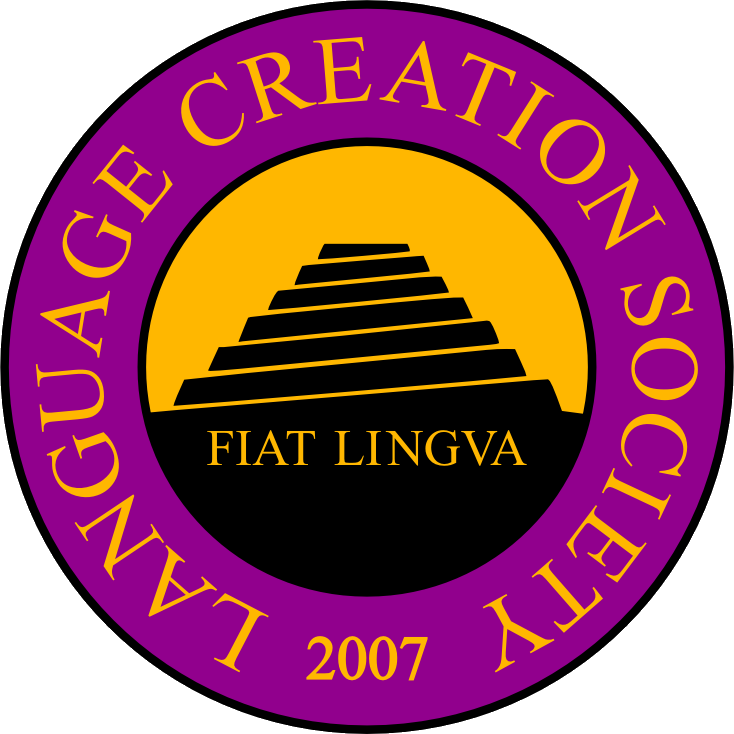The Third Language Creation Conference
The 3rd Language Creation Conference took place on March 21 and 22, 2009, in Providence, Rhode Island, USA. The conference was hosted by the Language Creation Society under the local direction of David Durand. The theme was Glossopoesis and Glottotechnia: The Art and Science of Language.
To see the webcam edition of some of the conference (we had multiple recording problems with this stream), click here. See also our YouTube channel.
- Stats: 43 people present plus 29 on IRC and/or Skype. 27 presenters plus 17 relay participants. 24 events. 13 posters.
- LCC3 Relay Results
- 2009 Smiley Award: Kēlen!
- IRC chat log (1mb HTML)
- Schedule and Presenters
- Program, posters, & slides
- Sale & auction
Conference Feedback
“I find myself developing my own meta-myth about conlangers as language-bringers. In the spirit of play, in the rigor of serious linguistic exploration, in the willingness to live in one’s own highest myth for extended periods of time, for explicitly not putting aside childish things, I think we are one of the points where the incursion of novelty in the run-up to 2012 reveals itself – in this case in a geyser of glyphs, a flow of new sounds, and newly ordered ways of making meaning.” – Diana Slattery
“By the end of the weekend I was quite overwhelmed, literally trembling with overstimulation and with awe at the superabundance of talent — it actually felt like an excess of talent, more than I could cope with, a diet of superficient richness.” – And Rosta, on CONLANG
“The impact of meeting people sort-of-known for 15 years for the first time cannot be overstated. It closed a gap I wasn’t even aware existed.” – Amanda Furrow
“The conference exceeded my expectations. I am very glad I went and talked, and my perception of conlanging has changed so much I have no idea yet what the full extent of the consequences of that change are on myself and my projects. Thank you for all you have done to enable that to happen.” – Paul Varkuzan
In short: LCC3 was a huge success. Thank you to everyone who made this possible, by contributing their work or presence.
About the LCC
The Conference is a set of talks and panel discussions about various issues related to language creation, from several different perspectives. It includes both fairly academic linguistic discussions as well as more general sociological ones; voices from many parts of the conlanging community; and people from all over America. The conference is open to the public; preregistration requested. Lunch and snacks will be provided.
Code of Conduct
The LCS expects all attendees to abide by the LCC Code of Conduct.
Attendees

Photograph by Ron Canepa
Standing: Schuyler Duveen, John Cayley, Brian Distin, Paul Varkuza, Sally Caves, David Durand, Amanda Babcock Furrow, Alex Fink, Sylvia Sotomayor, Jeff Burke, Tim Lang Smith, Ryan Connell, Jim Rosenberg, Colin Davis, Jeff Jones, Erin Peterson, David Peterson, Samantha Gorman, Lila Sadkin, Edrex Fontanilla, Despina Durand
Crouching: Denis Moskowitz, Jim Henry, Diana Slattery, Marc Moskowitz, Sai Emrys, Kelly Alioth Drinkwater, Bradford White, John Clifford
Behind camera: Ron Canepa
Not in photo but present: Baldvin Kári Sveinbjörnsson, Damon Baker, David Riley, Jim Henry’s parents and brother, Kári Emil Helgason, Kathy Lowry, Thomas Leigh, Tony Harris, William Weir & guest
Telepresent: And Rosta, Arnt Richard Johansen, Carsten Becker, Don Boozer, Emerson Knapp, Jan van Steenbergen, John Quijada, Jorge Cristino, Kaleissin, Matt Haupt, Mia Soderquist, Mez Breeze, Parker Glynn-Adey, Sentaro Mizuta, Steven Travis, Timo Paulssen, Trent Pehrson, Viktor Medrano, Vincent Pistelli, +10 name unknown
Not present but presenting: Arika Okrent, Marta Masferrer, Peter Ciccariello, Rob Sato, Trey Jones
What Is Language Creation?
Language creation (or “conlanging”—”conlang” is short for “constructed language”) is the process of inventing and (usually) describing a new language. Though the extent to which a language is created varies, creators might include sound systems, grammars, and writing systems for their languages. Some creators are also interested in cosmogenesis: the creation of cultures and worlds in which their languages are used.
What’s the Point?
People create constructed languages for a number of reasons. Artistic languages are often included in fictional works: for example, Tolkien’s Quenya in The Lord of the Rings or Klingon in Star Trek. International auxiliary languages (auxlangs) are intended for communication between people of different native languages, usually to prevent one being elevated over others or to making learning easier; some famous examples are Esperanto, Ido, and Interlingua. Logical and philosophical languages are used to test linguistic (and other) theories; Loglan and Lojban are well-known examples of the former, and Suzette Haden Elgin’s Láadan is an example of the latter — which she incorporated into the Native Tongue series of novels.
